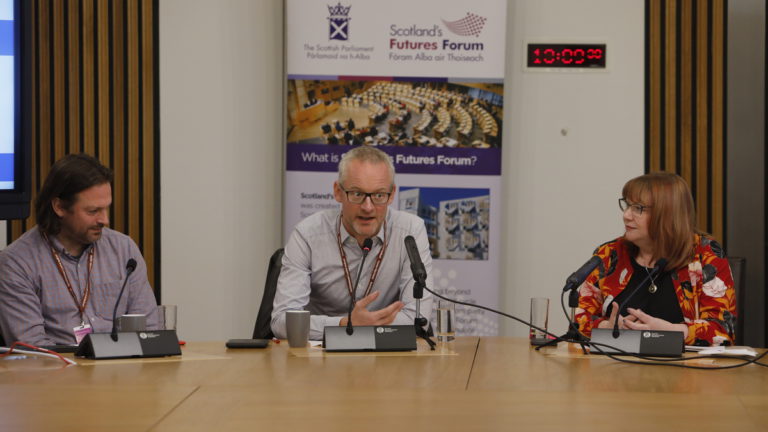Low Carbon Scotland Report
On 8 March 2010, Scotland’s Futures Forum held a seminar to consider how far we are from realising a low carbon economy in Scotland.
The seminar was attended by 90 policymakers, academics and those from the third and business sectors.
Key Learning Points
A lack of systemic policy making, lack of Scottish R&D and a lethargic attitude by the general public currently mitigates against Scotland realising its aspiration of becoming a ‘low carbon’ country.
Scotland should capitalise on its combined ‘first mover’ advantages of rich natural resources and unique constitutional set-up. We do not want to be in a position in 2030 of looking back to 2010 as a wasted opportunity.
Sector skills are key to the development of low carbon technology which needs to be more fully developed within Scotland
There should be more education, public awareness that a ‘low carbon’ or ‘resource efficient’ Scotland is an inherent good
Leadership is vital at all levels and on this agenda, there should be more systemic policy making across all areas of policy for the Scottish Government
We need to be active in setting standards and beware of technological blind alleys
Event report
Introduction
David Robson from the Scottish Government began the afternoon with a short presentation in which he set out the various dimensions of potential change involved in realising the transition to a low carbon Scotland.
He first considered the global drivers for a low carbon world, namely:
- Increased urbanisation
- Energy security
- Environmental degradation
- Globalisation of markets
- Access to food and water
- Global population growth
- Climate change
In order to achieve a low carbon Scotland, he believes that profound changes to our existing ways of living will be necessary:
- We will need to generate and use energy much more efficiently.
- We will need to invest heavily in new low carbon systems and infrastructure.
- We will need to adapt to an inevitable level of climate change.
- We will need to evolve our understanding and behaviours.
- Scotland has the potential to benefit globally from being at the vanguard of low carbon technology.
- Future energy security will be interdependent on a wide range of factors (environmental, food, water and health security).
- New partnerships between citizens, communities, businesses and governments will be necessary to deliver the change required.
He cautioned against our inability to envisage the consequences of consequences and suggested that our biggest failing may not be down to a lack of data but to a lack of imagination. Success in the past can blind us to a real understanding of a future reality.
Deliberations
Participants were asked a series of questions:
- How far are we from our aspiration of a low carbon Scotland? Discuss the opportunities and threats.
- When will these threats and opportunities manifest themselves between 2011 and 2025?
- And based on today’s discussions, identify the most important short and medium term actions within your own work area which you now need to consider to help achieve our shared aspiration of a low carbon Scotland.
Definitions
Some participants questioned how widely the aspiration of a ‘low carbon Scotland’ was
shared. Some were of the view that low carbon was only part of the jigsaw and that we should
also consider issues of biodiversity, water security, environmental degradation and so on.
One participant questioned whether the term ‘resource efficiency’ might resonate more widely.
David Robson felt we should also ask ourselves who we meant by ‘we’. Given that Scotland’s
population constitutes only 10% of the UK population as whole, perhaps we should be
thinking of solutions for us all.
Skills and technological development
There was a widespread feeling that sector skills will be crucial, although it was agreed that it was not always clear what skills were needed and that we were perhaps in a stage of ‘letting 100 flowers bloom’. A renewable energy skills group has been established to map the skills required.
It was noted that, as new technologies emerge, there are often competing standards (for instance, Betamax versus VHS) and that, over time, markets come to loathe incompatibility and usually settle on one standard. David Robson cautioned against ‘technological blind alleys’.
However, it was felt that Scotland should see the low carbon/resource efficiency agenda as an opportunity, particularly given its rich natural resources. One participant cited research which revealed that 50 cities across Europe saw Scotland as a leader in the development of low carbon technology.
Scotland’s advantages?
It was suggested by a number of participants that Scotland enjoys a unique ‘first mover’ advantage because of its natural resources and constitutional set-up. It is potentially small and nimble enough (and not beholden to membership of unwieldy international groups) to be more ambitious with this agenda.
Scotland is amongst just a dozen areas of the world to benefit from the best environment for wave technology, because its tides are highly predictable. And we have already seen rural communities experimenting with developing their own wind energy resources.
Many participants thought that Scotland should prioritise indigenous technology that has the potential to grow the economy as well as have an impact internationally on the environment.
We should be thinking how our ‘local’ actions can reverberate globally.
Timing
Most participants were of the view that, given the scale of the problem, we must put measurements in place now. When we reach peak oil is academic. David Robson said that we will need to invent as we go along, as the timeframe is not in our gift and, as yet, no-one has the successful model.
However, others questioned whether we have the capital and nous to make it happen. For example, transport constitutes a significant percentage of carbon emissions and substantial public investment would be necessary to develop new forms of low carbon transport.
Leadership
There was no question that political leadership was key. We should not wholly rely on market incentives to drive this agenda, particularly given that policymakers have had their fingers burned in recent years by the fallout from the financial crisis. The presumption that markets will self-regulate has been eroded in recent years.
A sense of vision at all levels – from national government to local communities – is also critical. Most participants were of the view that there would need to be a mixture of drive and action both top-down (e.g. regulation and licensing) and bottom-up (e.g. community-driven
projects).
Culture change
There was a unanimous view that behavioural and cultural changes will be necessary to bring about a low carbon Scotland. David Robson felt that transition would be no less challenging and fundamental than the transition of the former Eastern block countries to a market economy.
Not only must we seek ways to ‘decarbonise’ our economy but we should be looking to reduce consumption of resources.
Existing good practice
It was felt that there was a considerable amount of existing good practice and that we should capture what companies were already doing on this front. One participant cited the work already happening in the construction industry and asked that we consider how best to promote and disseminate this information.
With changes to the feeding tariff due to take effect in April 2010, we might see more individuals and communities producing energy as well as consuming it. And currently, properties for sale must have an energy performance certificate but perhaps we should consider extending this to all housing stock






